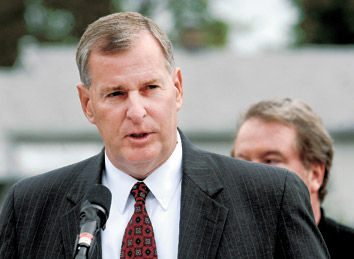Subscriber Benefit
As a subscriber you can listen to articles at work, in the car, or while you work out. Subscribe NowEditor's note: In the following story, The Associated Press looks back at Indianapolis Mayor Greg Ballard's eight-year tenure on the eve of his final day in office. IBJ took a long look at Ballard's legacy in a story published earlier this week.
Greg Ballard is ending eight years as Indianapolis mayor on Thursday, capping a period during which he oversaw the city's hosting of the 2012 Super Bowl while also struggling with persistent violent crime problems.
The Republican mayor is not seeking election to a third term. Democrat Joe Hogsett takes over city leadership Friday.
Ballard was a little-known retired Marine officer when he upset Democratic Mayor Bart Peterson in 2007 amid public anger over property tax increases.
Ballard drew attention by selling the city's water utility for $450 million in 2010 to pay for infrastructure projects and for criticizing GOP Gov. Mike Pence last spring over the state's religious freedom act. His last year was marred by City-County Council rejection of a proposed $1.75 billion criminal justice center project and the more than 140 homicides that are the city's most since at least 2006.
Of the violent crime problem, Ballard said, "Something's clearly happening nationally. I think life is cheap on the street right now."
Ballard recalls the February 2012 Super Bowl among the most joyous moments of his time as mayor, with large crowds at downtown events and the city basking in national attention.
"People would come up to me and literally told me, 'I never saw my city like this before. I didn't know we could do this sort of thing,'" he said.
Ballard became a major player in the debate over the religious freedom law during the national debate over whether the legislation would lead to discrimination against gays, lesbians and others. He said the Republican-backed law sent the "wrong signal" about Indiana being a welcoming place—and he served as grand marshal of the Circle City Pride Week parade in June.
Leonard Hoops, CEO of the city tourism agency Visit Indy, told the Indianapolis Business Journal that Ballard's action helped protect the city's convention business.
"We were trying to talk to a lot of customers who were concerned and threatening cancellation," Hoops said. "A couple of the biggest ones were getting antsy. The mayor said, 'I'll call these guys.' He made a lot of phone calls to buy us some time."
Ballard also backed steps aimed at making the city more appealing to young adults by adding about 200 miles of bike lanes and trails and starting an electric car-sharing service.
The Democratic-controlled council clashed with Ballard over the justice center plan and the BlueIndy electric car program. Critics say he often refused to work with others during his second term.
"His administration did many good things," Historic Urban Neighborhoods of Indianapolis president Marjorie Keinle told The Indianapolis Star. "But I was very troubled by the lack of soliciting public input."
The 61-year-old Ballard said he might work part-time as a consultant on energy or water issues. He also said he gets asked about running for governor in 2020.
"If they still want me to do that sort of thing, I will look at it," Ballard said. "Some people said they'll forget me by 2020. I'm fine with that."
Please enable JavaScript to view this content.

